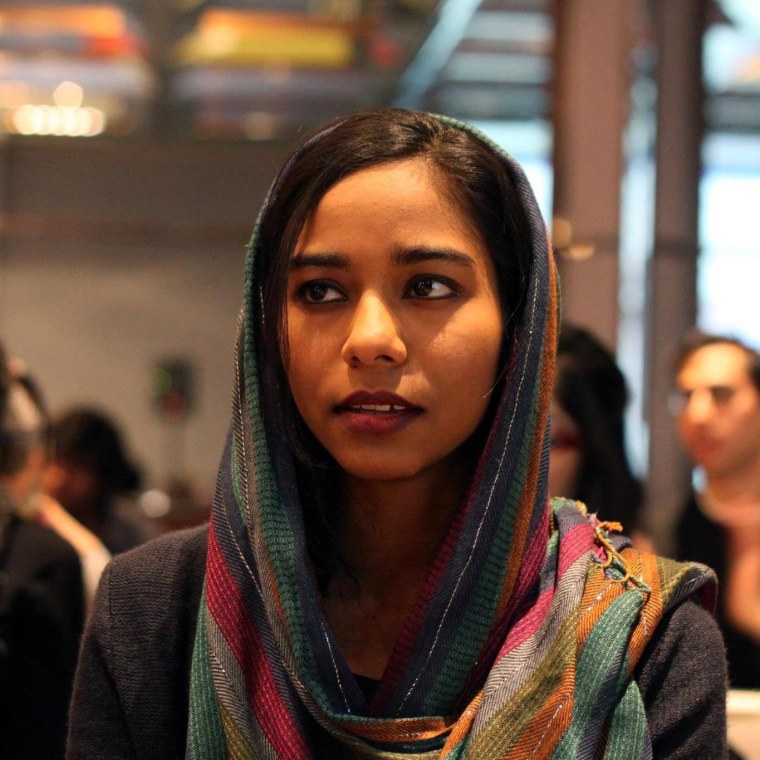By happy coincidence, Adeeba Shahid Talukder’s family was already gathered together when she learned that she had been selected to receive the 2017 Kundiman Poetry Prize.
“We were fasting because it was Ramadan,” Talukder told NBC News. “I insisted on giving the news before they broke their fast, which not everyone was happy about.”

As part of receiving the prize, Talukder’s upcoming manuscript “Shahr-e- jaanaan: The City of The Beloved” is expected to be published by Tupelo Press in late 2018 or early 2019. Many literary critics have commented on the influence of Urdu poetic traditions on Talukder’s work.
"In her subtle yet commanding debut, Adeeba Shahid Talukder’s poems become a ledger of transformation," Tupelo Associate Editor-in-Chief Kristina Marie Darling said in a statement that accompanied the announcement of the prize. "Here we trace the narrator’s careful path through seemingly incommensurable mythologies—of self, family, artistic legacy, and womanhood. What’s more, we are invited to glimpse the 'mirror' as it illuminates before her eyes."
“I was asked to translate a poem for class just as an exercise, and it was the first time that I realized that Urdu poetic culture was a culture of its own. It was the first time that I realized that Urdu was capable of beauty.”
Talukder noted that in many ways receiving the prize reflected her journey in accepting both her Pakistani heritage and the language she spoke growing up after moving from Pakistan to the United States as a baby in the late 1980s.
“My relationship with Urdu is pretty complex. I grew up being taught to hate my native language,” Talukder said, noting that she spoke it exclusively until she began kindergarten. “In school, my peers would make fun of me. Other Urdu speakers didn’t want to speak it to me because it was uncool.”
It was not until Talukder was in a high school class that she began to realize that embracing Urdu and her love of writing were not incompatible. “I was asked to translate a poem for class just as an exercise, and it was the first time that I realized that Urdu poetic culture was a culture of its own,” she said. “It was the first time that I realized that Urdu was capable of beauty.”
Talukder would go on to fully explore Urdu poetry when she began her undergraduate degree at New York University, where she majored in Middle Eastern studies and also began learning both Arabic and Persian. While discovering her love of those languages and their poetic traditions she also began writing poems about her own search for a romantic relationship.
“I was in my early twenties when I began writing the collection, and I was searching for love,” Talukder said. “But I didn’t want to write about the poems as myself, so I kind of hide behind these legendary Persian characters like Laila and Majnu and Shireen and Farhad who found their way into South Asian poetry. A lot of [my poems] were me making sense of what I felt through the lenses of these stories.”
She particularly credits poetry for helping her navigate her life after she was diagnosed with bipolar disorder at the age of 20. “Certain states [of bipolar disorder] can make you feel really grandiose, and I tried to get that aspect of it in my manuscript,” Talukder said. “There’s this sense of seeing yourself as larger than life and then acknowledging that you really are not.”
In addition to translating both Urdu and Persian poetry with her collaborator and co-translator Aria Fani, Talukder is now getting ready for the release of her upcoming chapbook "What Is Not Beautiful,” which explores the concept of beauty and the standards put upon young South Asian women, especially as they prepare for their weddings. “I began writing it after I got married, and the poems are about trying to find myself beautiful,” she said. “In my family, there’s so much emphasis on how you look, but [through writing these poems] I’m learning about myself in a more honest way.”
While she has been outspoken about the themes of body image, mental health, and romance in her poems, Talukder says she does not know exactly what to expect when her poetry collection is officially released. “I’ve shown my poems to my friends in the [poetry] community, but I don’t know what’s going to happen when it’s read by the wider world,” she said. “I’m a little worried, but I’m excited too. My story is being told and nobody can tell me not to tell it.”
Follow NBC Asian America on Facebook, Twitter, Instagram and Tumblr.